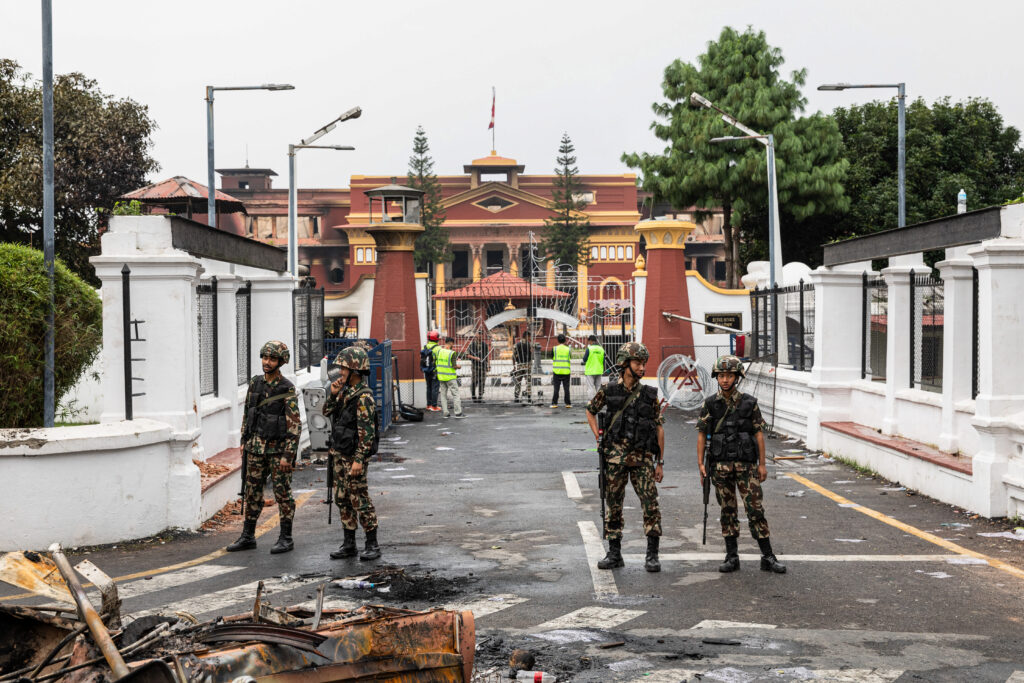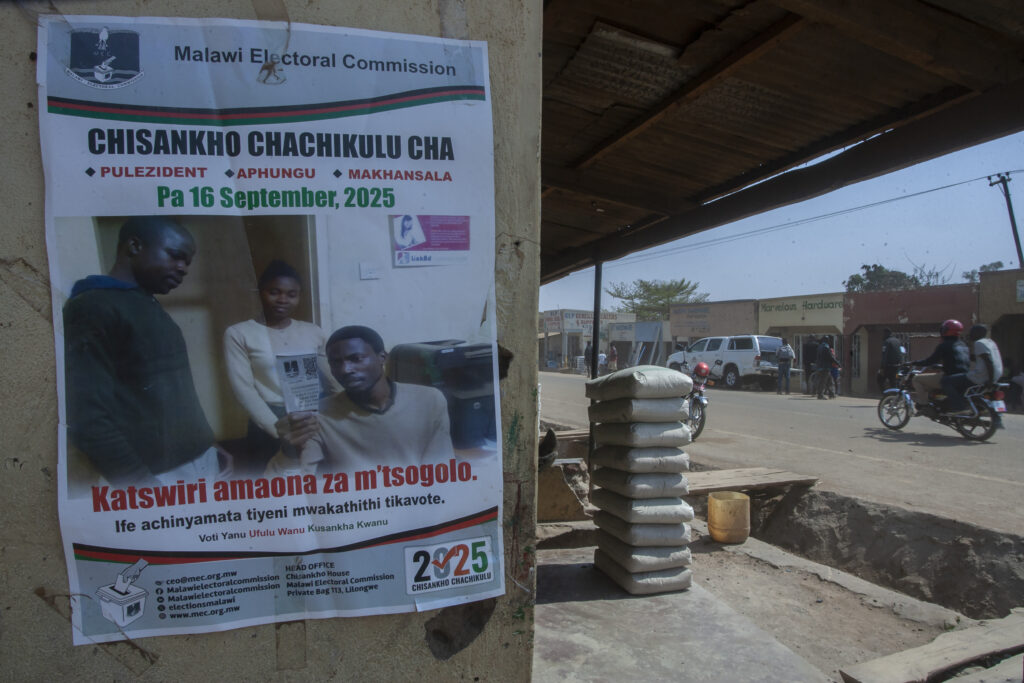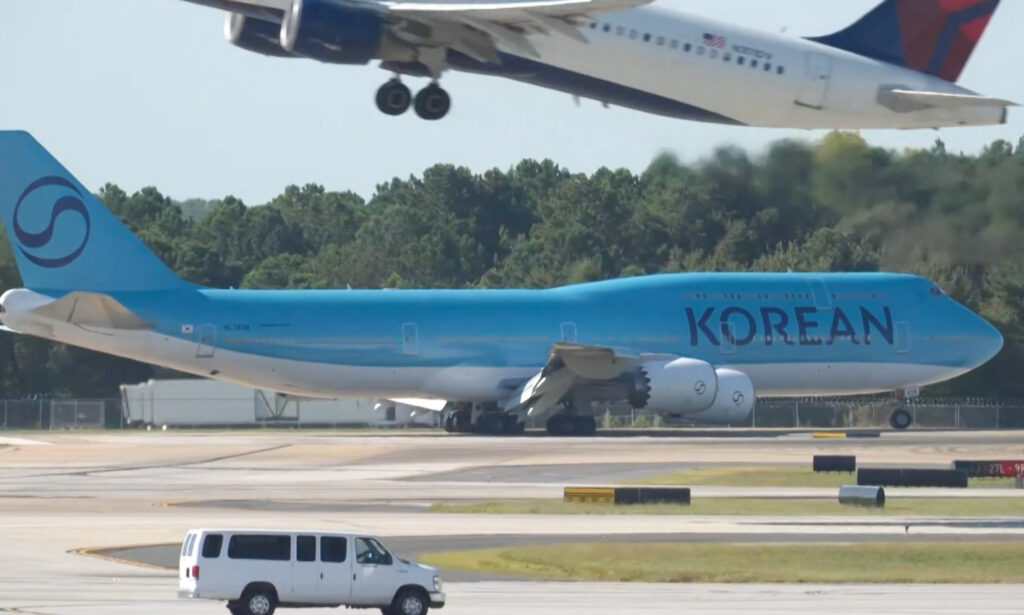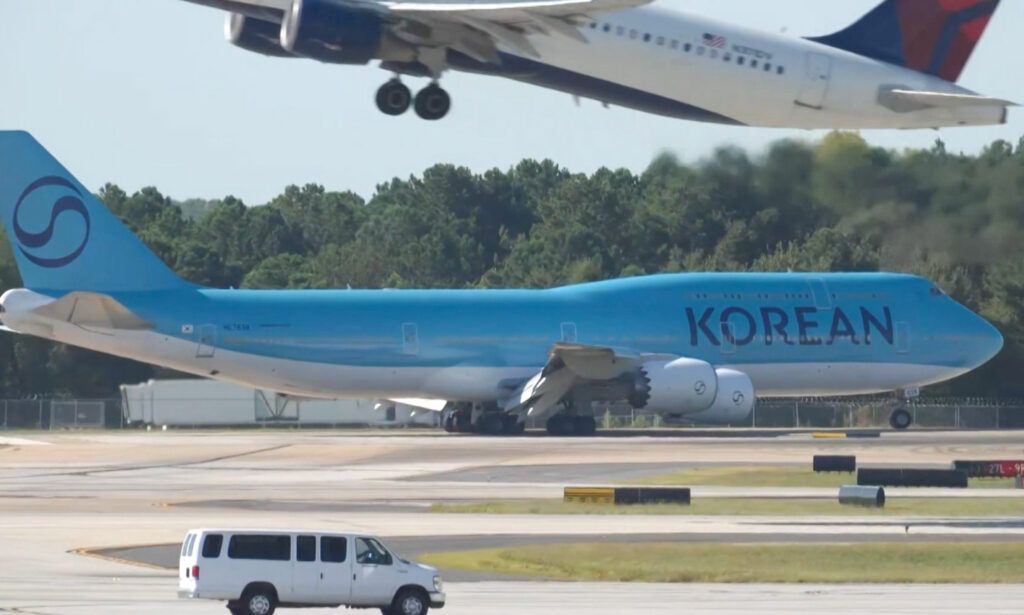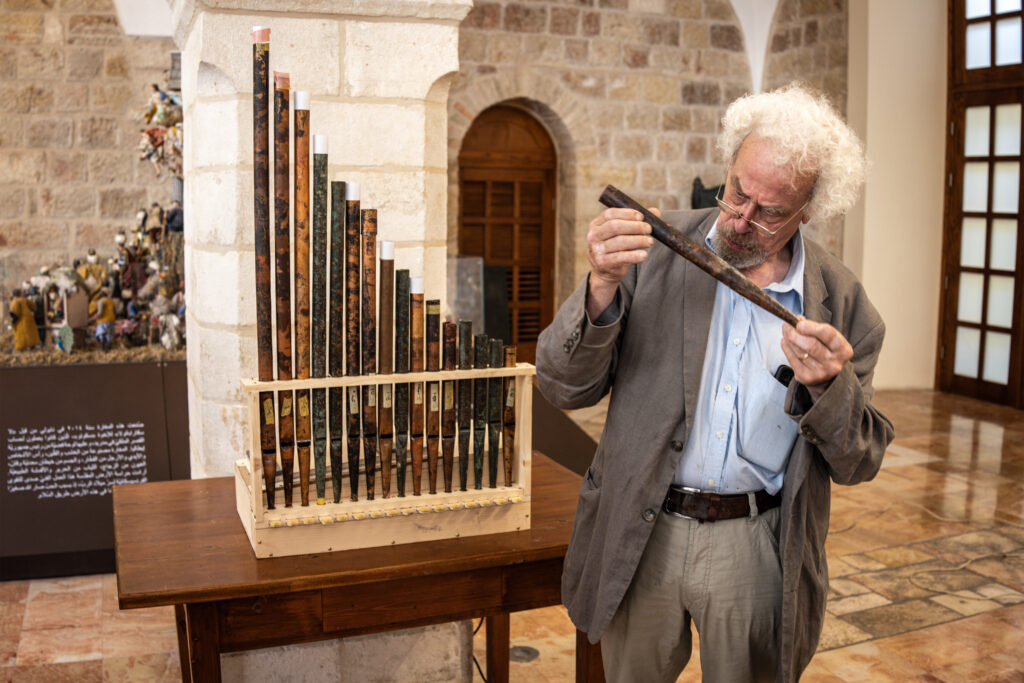Nepal ex-chief justice tipped to lead political transition
Nepal’s former chief justice Sushila Karki is the leading choice for interim leader, a representative of the “Gen Z” protesters said Thursday, after deadly demonstrations toppled the prime minister.The army has imposed a curfew to restore order in the Himalayan nation of 30 million people, after the worst violence in two decades ousted the government and left parliament ablaze on Tuesday.Army chief General Ashok Raj Sigdel held talks with key figures and “representatives of Gen Z” on Wednesday, a military spokesperson said, referring to the loose umbrella title of the protest movement.”Right now, Sushila Karki’s name is coming up to lead the interim government — we are now waiting for the president to make a move,” said Rakshya Bam, an activist who was among those at the meeting.- ‘Competing interests’ -Demonstrations began on Monday in Kathmandu against the government’s short-lived ban on social media and over corruption, with at least 19 people killed in the crackdown.A day later, protests escalated into an outpouring of rage nationwide, with government offices, a major hotel and other buildings set on fire. In the chaos, more than 13,500 prisoners broke out of jail.”We discussed with the army chief about the future,” Bam told AFP.”The conversation was about how we can move forward, keeping the peace and security of the country.”Karki, 73, an academic and Nepal’s first woman Supreme Court chief justice, has told AFP that “experts need to come together to figure out the way forward”, and that “the parliament still stands”.Constitutionally, 80-year-old President Ramchandra Paudel should invite the leader of the largest parliamentary party to form a government.But much of the political old guard has vanished from view.The protesters’ backing of Karki is not unanimous.In a virtual meeting on platform Discord that was attended by thousands on Wednesday, activists debated who should represent them, with several names floated.There were conflicting arguments and several names proposed.”There are divisions,” journalist Pranaya Rana said.”It is natural in a decentralised movement like this that there are going to be competing interests and competing voices.”- ‘New mandate’ -Kathmandu Mayor Balendra Shah, a 35-year-old former engineer and rapper, was also among the names suggested as potential interim leader.But Shah said in a post on Facebook that he “fully supports the proposal” to push Karki as the candidate.”The job of this interim government is to hold elections, to give a new mandate to the country,” he added.Soldiers patrolled the streets of the capital for a second day on Thursday, which appeared to be quiet, with multiple army checkpoints set up along the streets.Restrictions on movement were briefly lifted on Thursday morning to allow people to collect food and for essential workers.Communist party veteran KP Sharma Oli, 73, a four-time prime minister, resigned Tuesday in the face of protests. His whereabouts are unknown.His former coalition ally, 79-year-old Sher Bahadur Deuba of the Nepali Congress –- a five-time prime minister — has not been seen since unrest erupted.
Malawians head to polls in economic despairThu, 11 Sep 2025 05:37:04 GMT
Malawians vote for a new president next week in an election clouded by economic hardship as incumbent Lazarus Chakwera squares off against his predecessor in a race where few voters see a real alternative.Three of the 17 candidates for the September 16 polls have already served as president of the southern African nation and another …
Malawians head to polls in economic despairThu, 11 Sep 2025 05:37:04 GMT Read More »
Le raid sur une usine sud-coréenne pourrait décourager les investissements, selon Séoul
Le président sud-coréen Lee Jae Myung a averti jeudi que le raid des services de l’immigration américaine ayant débouché sur l’arrestation de centaines d’employés d’une usine de batteries Hyundai-LG était “déstabilisant” et pourrait avoir un effet dissuasif sur les investissements futurs.Quelque 475 personnes, dont une majorité de Sud-Coréens, avaient été arrêtées le 4 septembre par le Service américain de l’immigration et des douanes (ICE) sur le chantier de construction d’une usine de batteries Hyundai-LG dans l’Etat de Géorgie (sud-est).S’exprimant lors d’une conférence de presse à Séoul, le président sud-coréen a déclaré que l’incident pourrait avoir un “impact significatif sur les décisions d’investissement futures, en particulier lors de l’évaluation de la faisabilité d’opérations directes aux Etats-Unis”.M. Lee a expliqué que pour les entreprises sud-coréennes, les techniciens qualifiés étaient “essentiels”, lors de l’installation des infrastructures, des équipements et des usines.”Quelqu’un doit installer les machines, et la main-d’oeuvre nécessaire n’existe tout simplement pas localement aux États-Unis,” a-t-il souligné.- En “état de choc” -Le président sud-coréen a attribué le raid à des “différences culturelles”, expliquant qu’en Corée du Sud, les infractions mineures liées aux visas par des ressortissants américains n’étaient pas considérées comme “un problème sérieux”.Le président américain Donald Trump a finalement renoncé jeudi à expulser ces professionnels mais Séoul a décidé de les rapatrier car ils sont “en état de choc”, a précisé Cho Hyun le ministre des Affaires étrangères sud-coréen.Les salariés seront relâchés à 06H00 GMT, a annoncé jeudi M. Lee.”Le président Trump a demandé si les travailleurs sud-coréens détenus, tous des professionnels qualifiés, devaient rester aux Etats-Unis pour continuer à travailler et à former le personnel américain, ou s’ils devaient rentrer chez eux”, a détaillé le ministère des Affaires Etrangères sud-coréen dans un communiqué à l’AFP.Mais Séoul a répondu que “compte tenu de l’état de choc et de l’épuisement des travailleurs, il serait préférable qu’ils rentrent d’abord chez eux, puis qu’ils reviennent aux Etats-Unis pour travailler plus tard. La partie américaine a accepté cette position”, a-t-il été ajouté.La Corée du Sud a dépêché mercredi un Boeing 747-8I de Korean Air aux Etats-Unis pour rapatrier les travailleurs.La descente, au cours de laquelle ces travailleurs sud-coréens avaient été enchaînés et menottés, est “déstabilisante”, a souligné le chef de l’Etat.Le raid américain a fait la Une des médias en Corée du Sud, un pays qui a promis d’investir 350 milliards de dollars aux Etats-Unis, après des menaces américaines sur les droits de douane. Séoul a indiqué avoir obtenu que ses ressortissants ne soient plus menottés lors de leur rapatriement.Ce raid met en évidence les contradictions de l’administration Trump, qui “fait venir des usines de production à grande échelle tout en négligeant de former les travailleurs locaux”, estime Kim Dae-jong, professeur de commerce à l’université de Sejong.”En conséquence, les Sud-Coréens doivent former la main-d’œuvre locale”. Sud-Coréens et Américains devraient “travailler ensemble, et être non entravés dans leurs efforts”, a-t-il déclaré à l’AFP.Ces problèmes liés à la politique migratoire américaine “aurait dû être traités plus rapidement” souligne à l’inverse Cho Dong-geun, professeur émérite d’économie à l’université de Myongji, soulignant que les entreprises sud-coréennes étaient depuis longtemps conscientes des problèmes liés aux visas. Allié clé des Etats-Unis pour la sécurité dans le Pacifique, la Corée du Sud est aussi la quatrième économie asiatique, un acteur majeur de la construction automobile et de l’électronique. Plusieurs usines sud-coréennes sont implantées aux États-Unis. Les salariés arrêtés ne disposaient probablement pas d’un visa les autorisant à effectuer des travaux de construction, ont relevé des experts.
Le raid sur une usine sud-coréenne pourrait décourager les investissements, selon Séoul
Le président sud-coréen Lee Jae Myung a averti jeudi que le raid des services de l’immigration américaine ayant débouché sur l’arrestation de centaines d’employés d’une usine de batteries Hyundai-LG était “déstabilisant” et pourrait avoir un effet dissuasif sur les investissements futurs.Quelque 475 personnes, dont une majorité de Sud-Coréens, avaient été arrêtées le 4 septembre par le Service américain de l’immigration et des douanes (ICE) sur le chantier de construction d’une usine de batteries Hyundai-LG dans l’Etat de Géorgie (sud-est).S’exprimant lors d’une conférence de presse à Séoul, le président sud-coréen a déclaré que l’incident pourrait avoir un “impact significatif sur les décisions d’investissement futures, en particulier lors de l’évaluation de la faisabilité d’opérations directes aux Etats-Unis”.M. Lee a expliqué que pour les entreprises sud-coréennes, les techniciens qualifiés étaient “essentiels”, lors de l’installation des infrastructures, des équipements et des usines.”Quelqu’un doit installer les machines, et la main-d’oeuvre nécessaire n’existe tout simplement pas localement aux États-Unis,” a-t-il souligné.- En “état de choc” -Le président sud-coréen a attribué le raid à des “différences culturelles”, expliquant qu’en Corée du Sud, les infractions mineures liées aux visas par des ressortissants américains n’étaient pas considérées comme “un problème sérieux”.Le président américain Donald Trump a finalement renoncé jeudi à expulser ces professionnels mais Séoul a décidé de les rapatrier car ils sont “en état de choc”, a précisé Cho Hyun le ministre des Affaires étrangères sud-coréen.Les salariés seront relâchés à 06H00 GMT, a annoncé jeudi M. Lee.”Le président Trump a demandé si les travailleurs sud-coréens détenus, tous des professionnels qualifiés, devaient rester aux Etats-Unis pour continuer à travailler et à former le personnel américain, ou s’ils devaient rentrer chez eux”, a détaillé le ministère des Affaires Etrangères sud-coréen dans un communiqué à l’AFP.Mais Séoul a répondu que “compte tenu de l’état de choc et de l’épuisement des travailleurs, il serait préférable qu’ils rentrent d’abord chez eux, puis qu’ils reviennent aux Etats-Unis pour travailler plus tard. La partie américaine a accepté cette position”, a-t-il été ajouté.La Corée du Sud a dépêché mercredi un Boeing 747-8I de Korean Air aux Etats-Unis pour rapatrier les travailleurs.La descente, au cours de laquelle ces travailleurs sud-coréens avaient été enchaînés et menottés, est “déstabilisante”, a souligné le chef de l’Etat.Le raid américain a fait la Une des médias en Corée du Sud, un pays qui a promis d’investir 350 milliards de dollars aux Etats-Unis, après des menaces américaines sur les droits de douane. Séoul a indiqué avoir obtenu que ses ressortissants ne soient plus menottés lors de leur rapatriement.Ce raid met en évidence les contradictions de l’administration Trump, qui “fait venir des usines de production à grande échelle tout en négligeant de former les travailleurs locaux”, estime Kim Dae-jong, professeur de commerce à l’université de Sejong.”En conséquence, les Sud-Coréens doivent former la main-d’œuvre locale”. Sud-Coréens et Américains devraient “travailler ensemble, et être non entravés dans leurs efforts”, a-t-il déclaré à l’AFP.Ces problèmes liés à la politique migratoire américaine “aurait dû être traités plus rapidement” souligne à l’inverse Cho Dong-geun, professeur émérite d’économie à l’université de Myongji, soulignant que les entreprises sud-coréennes étaient depuis longtemps conscientes des problèmes liés aux visas. Allié clé des Etats-Unis pour la sécurité dans le Pacifique, la Corée du Sud est aussi la quatrième économie asiatique, un acteur majeur de la construction automobile et de l’électronique. Plusieurs usines sud-coréennes sont implantées aux États-Unis. Les salariés arrêtés ne disposaient probablement pas d’un visa les autorisant à effectuer des travaux de construction, ont relevé des experts.
Silent for 800 years, medieval organ sings again in Jerusalem
The pipes of a medieval organ, buried for centuries and discovered near the Church of the Nativity in Bethlehem in the occupied West Bank, are once more filling a Jerusalem monastery with ancient melodies.”This is a window into the past… we have the opportunity for the first time in modern history of listening to a medieval sound which is a thousand years old,” said David Catalunya, a Spanish researcher who has worked for more than five years to bring the 11th-century instrument back to life.”And it’s not through a recreation or a hypothetical reconstruction, but it’s really the original sound: the same vibration that the Crusaders heard at the Nativity Church,” he told AFP.Dating nearly as far back as the invention of the instrument itself, it was discovered in 1906 at the Biblical birthplace of Jesus Christ.Catalunya pulls on small tabs to play the organ — which he fondly refers to as a “miracle” — expelling a formidable ringing from the otherwise modest wooden instrument.Currently housed in the Monastery of Saint Saviour in Jerusalem’s Old City, the instrument is set to be displayed in a museum of the Franciscan Custody of the Holy Land.”It’s like finding a living dinosaur, because it’s something we knew existed but we only know from fossils, so there’s very limited evidence,” said Alvaro Torrente, a musicologist who participated in the restoration project.”This is not a fossil, this is the real object and the real sound,” he told AFP.- Chance discovery -It was discovered “almost by chance”, according to Father Eugenio Alliata, a Franciscan archaeologist attached to the mission in charge of several holy sites, including the Church of the Nativity in Bethlehem.During construction of a pilgrim hostel, a set of 222 copper pipes and a bell carillon were unearthed near the site.It was seemingly buried with “utmost care”, according to Catalunya, meaning researchers were able to reconstruct the instrument with painstaking care.Koos van de Linde, one of the world’s leading organ specialists who also consulted on the project, said that “the hope the Crusaders who buried these pieces had, that one day they would resound again, was not in vain.”It was an immense honour to witness and participate in their resurrection,” he continued.To the experts, the instrument is unique not just for its complexity — 18 pipes producing a single note — or what Catalunya says is an “incredible state of preservation”, but also its antiquity.While the oldest organs studied by historians are from the 15th century, this one was built in the 11th century in France before being transported to Bethlehem by Crusaders in the 12th century, Catalunya said.”The Christians of Europe brought to the Church of the Nativity in Bethlehem the most avant-garde musical instrument used at the time in liturgy: the organ, an instrument designed to become the emblem of sacred music,” Torrente told AFP.He hopes the discovery will spark more interest in what the research team simply calls the “Bethlehem organ”, which Torrente says has not yet sung all its tunes.

